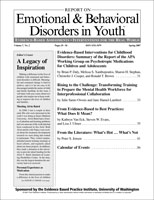Assessing Teachers’ Attitudes and Willingness to Adopt Evidence-Based Practices in Classrooms: A Pilot Study
Author: Kelly E. Monahan.; Heather L. McDaniel.; Melissa W. George.; Mark D. Weist.
Source: Volume 14, Number 02, Spring 2014 , pp.37-42(6)

< previous article |next article > |return to table of contents
Abstract:
Children with severe emotional or behavioral disorders are at risk for learning difficulties, poor social relations, and misbehaviors, which often lead to poor academic outcomes. By using evidence-based practices (EBPs), teachers can help improve the functioning of these students and prevent school dropout. In spite of the importance of EBPs to positive outcomes, however, EBPs are underused in schools and, if implemented, are often implemented poorly. There is evidence that attitudes toward EBPs affect their adoption, but exploration of teachers’ attitudes is limited. This paper examines the attitudes of teachers toward EBPs using a modified version of the Evidence-Based Practice Attitude Scale (EBPAS). Preliminary results suggest that the modified EBPAS is a promising tool for assessing teachers’ attitudes toward EBPs, setting the stage for an important avenue of further research.Keywords: Emotional and behavioral disorders; youth; evidence-based practices; EBPAS; teachers’ attitudes
Affiliations:
1: University of South Carolina; 2: University of South Carolina; 3: University of South Carolina; 4: University of South Carolina.